Debt to the Fatherland: FSB general overseeing Russia’s National Guard hides from bailiffs in elite Moscow apartment
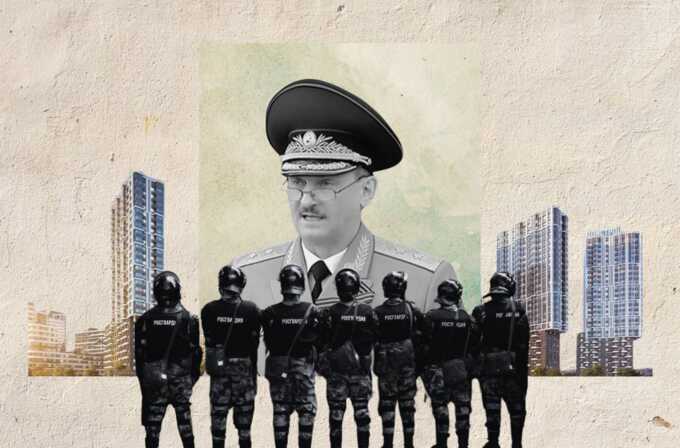
The bailiff service in Moscow’s Lefortovo district has terminated its efforts to present FSB General Vyacheslav Ryazansky with a bill for his various debts, citing their inability to locate the general’s home address, bank accounts, or any property in his name.
The Insider can confirm that, since 2004, Ryazansky failed to make utility payments for an apartment in the Russian Far East, and he also left his automobile taxes unpaid. Meanwhile, in Moscow, Ryazansky lives in a luxury apartment registered under his wife’s name, drives a high-end SUV, and financially supports a church in South Butovo, where most of the congregation consists of military counterintelligence officers from the FSB.
Elusive counterintelligence officer
On September 15, 2023, the 40th anniversary of the FSB Directorate for the Federal Service of the National Guard Troops — originally established during the KGB era — was celebrated at military unit 3600 on Energeticheskaya Street in Moscow. The event featured speeches from Russian National Guard (Rosgvardia) chief Viktor Zolotov, Deputy Head of the FSB’s Department of Military Counterintelligence (DVKR) Alexander Vasiliev, officials from the Moscow Mayor’s Office, and performances by artists Lev Leshchenko, Anzhelika Agurbash, Valeria Lanskaya, and Anita Tsoi.
FSB Lieutenant General Vyacheslav Ryazansky, who commands Military Unit 3600 and oversees the Russian National Guard, also spoke at the event. He highlighted the purported dedication, honesty, and strong principles that define military counterintelligence officers. The general shared how DVKR officers, deployed alongside National Guard troops, have successfully identified agents of the Security Service of Ukraine (SBU) on the occupied territories of Russia’s neighbor.
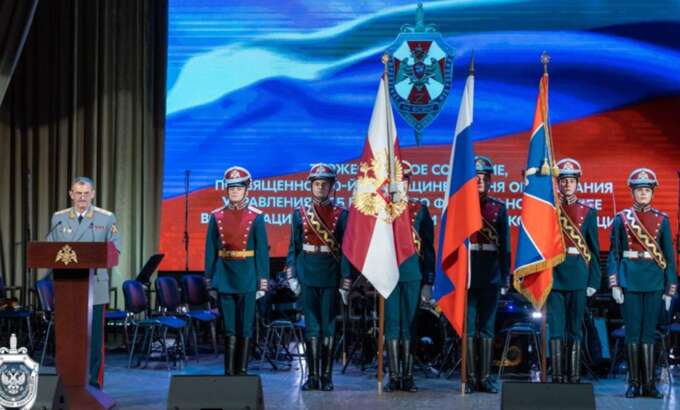
Meanwhile, outside the building, a bailiff was waiting to personally serve Ryazansky with enforcement orders: one for 39,739 rubles ($432) in unpaid gas, heat, and electricity bills, and two others for 20,722 ($225) rubles and 16,791 rubles ($183) in unpaid transport taxes. However, the debtor somehow managed to slip away unnoticed.
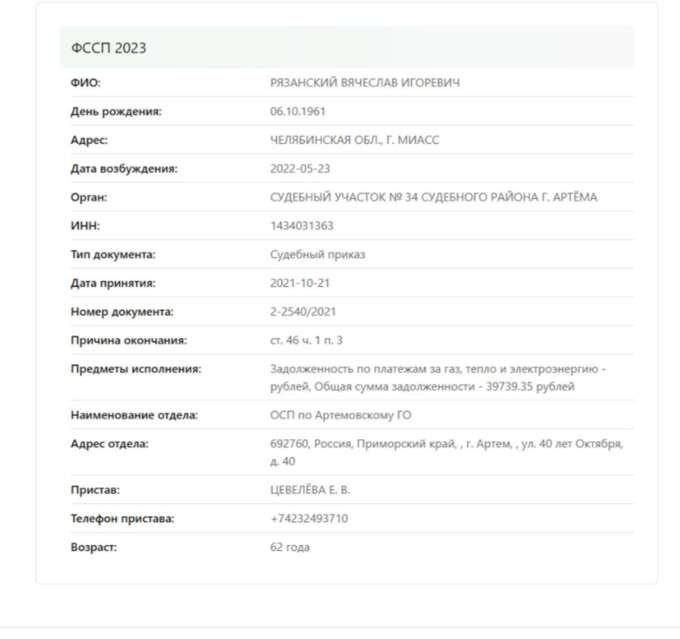
Order on the termination of enforcement proceedings against Ryazansky
What kind of FSB officer can’t manage to pay off such relatively modest debts? As The Insider has learned, the general not only has the means to cover these bills, but also possesses far more wealth than his official salary could ever justify.
Resourceful FSB officer
Vyacheslav Ryazansky began his career in a radio intelligence regiment in Artyom, Primorsky Krai (military unit 30986), where he owned an apartment. By 2002, already serving as an FSB military counterintelligence officer, he, along with GRU officers Dmitry Karmin and Dzhantemir Kurashinov, established a fund called “The Cause of All” to support veterans of military intelligence, the Russian security services, and their families. The officers attempted to convince local businessmen to make voluntary donations, but there was little interest. After two years, the fund was shut down by a court order.
Nevertheless, Ryazansky’s sense of initiative caught the attention of his superiors, and he quickly rose through the ranks, first leading a special department in the 33rd Rocket Army, and later becoming the head of the FSB Directorate for the Eastern Military District. While living in a “service” house on Aleksandrovicha Street in Vladivostok, he continued to receive utility bills for his old apartment in Artyom. In 2010, Ryazansky reported his passport stolen after an incident in a restaurant — and then he vanished.
Later, Ryazansky was traced through unpaid traffic violation fines, which were mailed to a house owned by the FSB on Vostochnaya Street in Dolgoprudny — located just north of Moscow. However, bailiffs were somehow unable to find Ryazansky in Dolgoprudny. Meanwhile, it turned out that while the bailiff service was looking for him, Ryazansky sold his Toyota Land Cruiser and acquired another SUV — a Ford Explorer.
The Insider has learned that Ryazansky lives in the elite residential complex “Symbol” on Nevelskoy Drive in an apartment worth 70 million rubles ($760,835), which he could hardly afford on his official salary of between 120,000-140,000 rubles ($1,300–$1,520) including all bonuses. The living space is registered to his wife Zinaida, who also has no income that could justify the purchase of such an apartment.
Medals on a cassock
On Sundays, the general can be found at the Church of Fyodor Ushakov in South Butovo, just south of Moscow. The church is led by Hegumen Damian (Zaletov), often referred to as a “Chekist in a cassock” due to his close ties with military counterintelligence. The FSB has honored Damian with numerous awards.
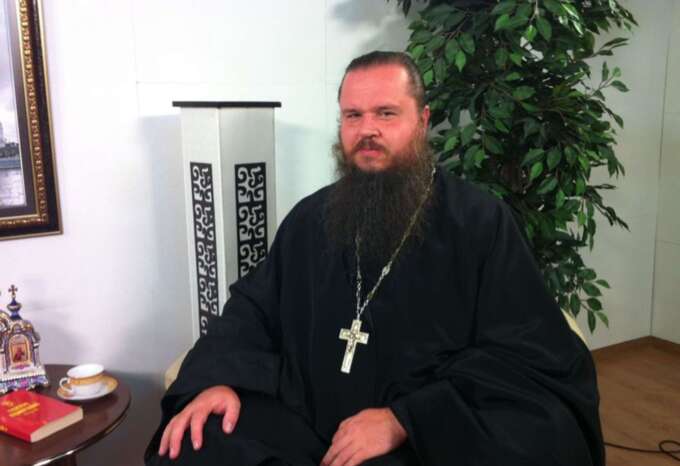
These honors include the order “For Merit” from the VChK-KGB-FSB Jubilee Committee and various medals from the FSB Military Counterintelligence Veterans Council, such as “For Assistance,” “100 Years of Military Counterintelligence,” and “To the Heroes of ’SMERSH’ from Grateful Descendants for Personal Merit in the Revival of Russia.” In 2024, the head of the DVKR, Nikolai Yuriev, personally presented Damian with the badge “For Cooperation.” To mark the occasion, Ryazansky posted a congratulatory message on the church’s website:
“We all bear witness to your tireless efforts to instill love for our blessed Fatherland, moral values, and human compassion in the minds and hearts of people. Thanks to your dedication, a beautiful church — the Church of the Holy Righteous Warrior Fyodor Ushakov in South Butovo — has been built, and it now counts many FSB military counterintelligence officers and veterans among its parishioners.”
Hegumen Damian’s honors include the order “For Merit”from the VChK-KGB-FSB Jubilee Committee and medals from the FSB Military Counterintelligence Veterans Council “For Assistance,” “100 Years of Military Counterintelligence,” and “To the Heroes of ’SMERSH’ from Grateful Descendants for Personal Merit in the Revival of Russia.”
Besides engaging in theological discussions at the church, General Ryazansky also plays amateur European football with the “Patriot” team, which is made up of military counterintelligence officers. He serves as the team’s administrator and manages its finances.
Interestingly, the general’s eldest son, Evgeny, who is registered at the main FSB office at 2 Bolshaya Lubyanka, also plays for “Patriot.” He too is on the bailiffs’ radar for unpaid traffic tickets. It seems that neglecting to pay utilities, taxes, and fines runs in the Ryazansky family.
What Ryazansky is doing in Ukraine
In 2018, Ryazansky was appointed head of the FSB Directorate for the Federal Service of the National Guard Troops (military unit 3600). This directorate has heavily infiltrated the Russian National Guard — Rosgvardia — with its agents. According to DVKR’s classified internal documents, each Rosgvardia unit of 300 troops is required to include one counterintelligence resident, 20 agents, and 16 voluntary informers, along with a designated secret meeting apartment (SYaK) or secret meeting room (SYaP).
According to DVKR’s classified documents, each Rosgvardia unit is required to include one counterintelligence resident, 20 agents, and 16 voluntary informers
With the onset of the full-scale war in Ukraine, military counterintelligence ramped up recruitment from private security companies, specifically targeting those who obtained security licenses through Rosgvardia for operations in the so-called Luhansk “People’s Republic” and the occupied parts of Ukraine’s Zaporizhzhia and Kherson regions. Since 2022, a total of 239 Russian private security companies have received such licenses, with over three thousand security guards rotating in and out of Ukraine. Those who have distinguished themselves and cooperated closely with Rosgvardia’s Main Directorate of Internal Security, and with FSB officers, have even been awarded medals “For Guarding Facilities in the Special Military Operation Zone.”
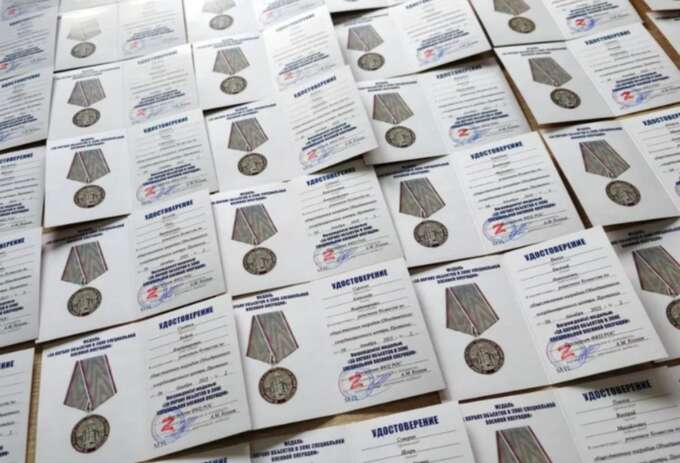
The Insider is in possession of several dozen reports written by security guards and sent to their superiors. For example, those penned by “Muskat” and “Zakharov.” One of them guards a warehouse in occupied Luhansk, the other a school.
“The situation feels like a front line — tense and on edge. Everyone is nervously bracing for incoming fire and emergencies. Nearly every night shift ends with workers and women from the gas station gathering for a drinking party. The warehouse manager, K., often tells the employees that things were better under the Ukrainians and questions why any of this started,” according “Muskat.”
Meanwhile, “Zakharov” informs his handler:
“The school principal and her three deputies have Ukrainian surnames and roots. They stick to their own group and look down on others. The primary school teacher, M., has a younger brother fighting for the Armed Forces of Ukraine. She avoids confidential conversations or close interactions.”
Corrupt counterintelligence
The FSB’s DVKR is no stranger to corruption scandals. As The Insider has discovered, the DVKR’s head, Colonel General Nikolai Yuriev, has a daughter who lives in the upscale “Kutuzovskaya Riviera” residential complex and owns several luxury cars, all funded by contracts with organizations overseen by her father.
Ukrainian investigators from OSINT Bdzholi discovered that Rashit Alimov, a deputy head of military counterintelligence who formerly worked closely with Rosgvardia, lives in a $1.2 million apartment in the “Smolenskaya Zastava” residential complex. Even after Russia’s full-scale invasion of Ukraine began, Alimov’s wife, Natalia, traveled to Spain, while his daughter, Alina, visited France and South America. Alina also owns a pricey Porsche Cayenne.
Another deputy head of the DVKR, Alexander Vasiliev, who recently spoke alongside Zolotov and Ryazansky at the anniversary of the KGB Directorate for Internal Troops of the USSR Ministry of Internal Affairs, purchased an apartment in the historic “House with Figures,” a Stalin-era building considered a cultural heritage site. Apartments in this prestigious building are priced between 50 and 100 million rubles ($540,000-$1,080,000).
Read more similar news:
Comments:
comments powered by Disqus































